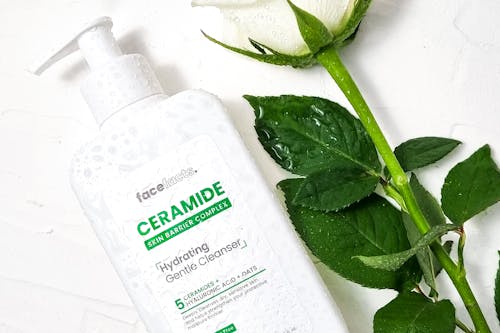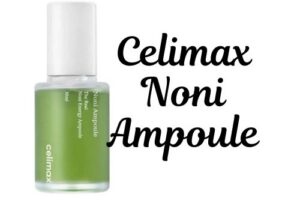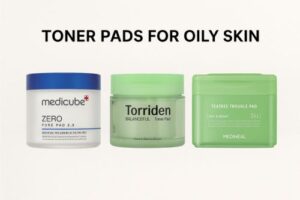The Role of Ceramides in Repairing the Skin Barrier
What Are Ceramides?
Let’s break it down: ceramides are fats that live naturally in your skin, making up about 30–50% of its outer layer. They’re not just hanging out there for no reason—they’re the MVPs when it comes to keeping your skin healthy and happy.
Imagine Your Skin as a Brick Wall
Picture your skin as a giant wall. The skin cells are the bricks, and ceramides? They’re the mortar holding everything together. Without enough ceramides, that wall starts to crumble, which is when you notice dryness, irritation, and your skin feeling less like a smooth canvas and more like sandpaper.
The Hydration Hero
One of ceramides’ superpowers is keeping moisture locked in. They act like a seal, stopping all the good stuff (aka hydration) from escaping. That’s why when your skin’s feeling dry or tight, adding ceramides can be a game-changer—they basically fill in the gaps and get things running smoothly again.
Your Skin’s Bodyguard
Ceramides aren’t just about moisture, though. They’re also your skin’s shield, keeping out all the nasty stuff like pollution, bacteria, and allergens. When your ceramides are doing their job, your skin can handle life’s daily battles a whole lot better.
So, in short, ceramides are like the quiet overachievers of the skincare world—they might not always get the spotlight, but without them, your skin just wouldn’t function the way it should.
Benefits of Ceramides
1. Lock in Moisture:
Ceramides are like the ultimate seal for your skin, locking in hydration and keeping dryness at bay. By preventing water from escaping, they ensure your skin stays soft, plump, and healthy-looking all day long.
2. Strengthen the Skin Barrier:
Think of ceramides as the shield your skin needs to fend off environmental irritants, pollution, and bacteria. A strong barrier means less redness, irritation, and breakouts.
3. Enhance Smoothness and Suppleness:
Ceramides work overtime to improve your skin’s texture, leaving it smoother, softer, and more resilient. They’re the secret ingredient for achieving that youthful, bouncy glow.
4. Alleviate Skin Conditions:
Struggling with eczema or dermatitis? Ceramides come to the rescue, helping to restore compromised skin and reduce inflammation. They’re a soothing savior for anyone with sensitive or reactive skin.
5. Support Anti-Aging:
By keeping your skin hydrated and protected, ceramides reduce the appearance of fine lines and wrinkles. They’re not a fountain of youth, but they’re pretty close when it comes to preserving your skin’s natural vitality.
Importance of Ceramides in the Skin Barrier
Supporting the Skin’s Defense:
Think of ceramides as the glue that keeps your skin’s barrier intact. They seal in moisture while blocking out unwanted irritants like pollution, allergens, and bacteria. Without enough of them, that protective wall starts to crack, leaving your skin vulnerable to dryness and irritation.
The Aging Factor:
As we age, our natural ceramide levels take a nosedive. Combine that with environmental stressors like sun exposure, and your skin barrier can weaken even further. The result? More dryness, sensitivity, and an overall dull appearance.
Hydration Hero:
When ceramide levels drop, your skin struggles to hold onto moisture. This can lead to rough patches, flaky skin, and even chronic conditions like eczema. Essentially, ceramides are a hydration powerhouse—without them, your skin’s moisture game suffers big time.
By replenishing ceramides, you’re not just repairing your skin barrier; you’re giving your skin the tools to thrive and stay resilient.
Types of Ceramides
Natural Ceramides:
These are the ceramides your body produces naturally, forming part of your skin’s outer layer. Beyond your own skin, they’re also found in animals and plants like soy. They’re your skin’s first line of defense, but they can deplete over time due to aging or environmental factors.
Synthetic Ceramides:
Lab-made and super stable, synthetic ceramides are a skincare industry favorite. They’re designed to mimic your skin’s natural ceramides, minus the contaminants or variability found in natural sources. These make your creams and serums more effective and long-lasting.
A Wide Variety:
Believe it or not, there are 12 different types of ceramides—think of them as a team, each with its own role. For example, Ceramide 1 strengthens your skin’s structure, Ceramide 3 locks in moisture, and Ceramide 6-II smooths the surface. Together, they keep your skin barrier strong and hydrated.
Whether natural or synthetic, ceramides are the unsung heroes working behind the scenes to keep your skin happy and healthy.
Skin Barrier and Ceramides
How It Works:
Your skin barrier is like a wall, and ceramides are the mortar holding the bricks together. Along with natural moisturizing factors (NMFs) and the lipid layer, ceramides seal everything tightly, keeping moisture locked in and irritants locked out. This teamwork ensures your skin stays hydrated, smooth, and resilient.
What Happens When It’s Disrupted:
When ceramide levels drop—whether due to aging, environmental stress, or over-cleansing—the “wall” starts to crack. These gaps make it easier for water to escape, leaving your skin dry, tight, and prone to sensitivity. Irritants like pollution and allergens can also sneak in, leading to redness and irritation.
Think of ceramides as your skin’s personal repair crew—without them, the barrier struggles to function, leaving your skin vulnerable and less healthy. That’s why replenishing ceramides is key to restoring balance and keeping skin happy.
Ceramides in Skincare
Who Benefits Most:
If your skin is dry, sensitive, or showing signs of aging, ceramide-rich products can be a game-changer. But don’t worry—ceramides work for all skin types, so even if you have oily or combination skin, they’ll help strengthen your barrier without clogging pores.
Bonus Ingredients for Extra Benefits:
To boost their effectiveness, many ceramide products include anti-inflammatory ingredients like niacinamide or penetration enhancers that help ceramides dive deeper into your skin. This combo makes them work harder to repair and protect.
Tailored to Your Needs:
Not all ceramides are created equal! Products featuring specific ceramides—like Ceramide 1 for elasticity, Ceramide 3 for hydration, or Ceramide 6-II for exfoliation and barrier repair—can target unique skin concerns. So, whether you’re battling dryness or looking to smooth rough patches, there’s a ceramide product out there for you.














Post Comment